Landis Active Citizens make positive impact on Lehigh Valley community
By Stella Katsipoutis-Varkanis
Each year, the Landis Center recognizes students, faculty, staff, and community partners who strengthen the bond between campus and community through education, outreach, and service. These community members embody the ideals of individual commitment, a common purpose, and active citizenship. Through their work, they are making the Lehigh Valley—and the world—a better place. Meet the 2022 Landis Active Citizens.
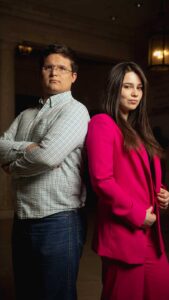 Kait Ahern ’23 and Dimitri Chernozhukov ’25
Kait Ahern ’23 and Dimitri Chernozhukov ’25
Lafayette Votes!
In a democracy, every vote counts. And through their work with Landis’ Lafayette Votes! program, Kaitlin Ahern ’23 and Dimitri Chernozhukov ’25 aim to ensure that all Lafayette students have the resources and opportunities they need to cast their ballots. Not only do they help answer students’ questions about voting and civic engagement, and educate students about the power of the youth vote to significantly impact the outcome of elections; they also help first-time voters navigate the registration and voting processes, which can often be complex. When Lafayette students were improperly registered by well-intended external political groups in November 2022 and were turned away at the polls on Election Day, Ahern and Chernozhukov—along with their fellow Lafayette Votes! members—worked diligently with the Election Protection Hotline to enable those students to submit provisional ballots.
Why Heart Landis
“I love Landis because it allows students to make meaningful connections with the Easton area,” Ahern says. “I believe an integral part of any education is learning from, and giving back to, the community around you. Being active in community and civic service is a wonderful thing that every student should try at least once while at Lafayette. There are so many ways to give back to your community through the Landis Center; there truly is an experience and volunteer program for every student.”
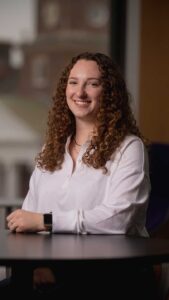 Kaitlyn Hilley ’23
Kaitlyn Hilley ’23
Alternative School Break (ASB)
Kaitlyn Hilley ’23 first became involved in ASB as a general member during her first year at Lafayette, as she was drawn to the opportunity to travel and immerse herself in social justice work abroad. Now, as the club’s president, Hilley is leading the charge in reestablishing ASB after travel restrictions resulting from the COVID-19 pandemic temporarily brought it to a halt. In addition to educating Lafayette students on how they can make an impact on global communities through ASB, Hilley helps implement what students learn about social justice topics during their ASB experiences by helping to plan and host various educational events on campus and beyond. After ASB students went on their first post-COVID trip this winter—during which students traveled to Denton, Texas, and worked at a community center for adults with autism to learn more about disability advocacy and awareness—Hilley is now working with her team to partner with organizations in the Easton community, as well as various departments and student organizations at Lafayette, to get Lafayette students involved in similar work here at home.
Why Heart Landis
“Interacting with different community members and marginalized communities is of course really impactful; but also, the people I’ve met and the friendships I’ve made through these organizations have been really special,” Hilley says. “Working with Landis, I’ve met some of my best personal and professional mentors, and I hope to continue to be in touch with them in the future. Making those connections and building community on and off campus sets you up to be a better citizen, learn about different topics, and become engaged in your community in an impactful way. Not only does the work of Landis help people in this moment, but it’s also building a better citizenship moving into the future, which will spread across the country and across the world and make it a better place.”
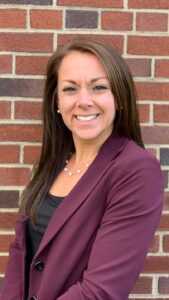 Kelly Post-Sheedy
Kelly Post-Sheedy
Firth Youth Center
Kelly Post-Sheedy is executive director of the Joseph H. Firth Youth Center (FYC), an organization devoted to serving the vulnerable youth of Phillipsburg, N.J., through a wide variety of educational, recreational, and athletic opportunities. FYC has a longstanding partnership with Landis’ MOSAIC and Pre-Orientation Service Program (POSP), and Post-Sheedy works closely with Lafayette to provide invaluable opportunities for student volunteers to serve as positive role models for underserved, impressionable youth. MOSAIC students volunteer at FYC’s after-school program, which serves 70 youth each day. POSP volunteers devote three days to enriching FYC’s summer camp—which serves over 100 children over the course of 10 weeks—by planning and engaging in STEM and art projects, athletic competitions, and other fun activities with the children.
Why Heart Landis
“The partnership with the Landis Center has been extremely beneficial to the Firth Youth Center in terms of connecting incredible role models with our vulnerable youth,” Post-Sheedy says. “They have provided dozens of volunteers each year to tutor, play with, mentor, and enrich the lives of our kids. Our kids often ask, ‘Are the college students coming back today?’ They look forward to meeting new young adults who want to spend time with them. As each program ends, it’s amazing to hear that the partnership has made just as much of a positive impact on the lives of the Lafayette students. The board of directors and staff of FYC are incredibly grateful for the staff and volunteers of the Landis Center.”
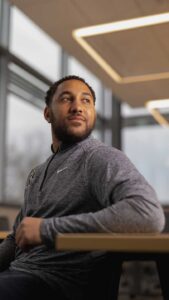 Gabriel Robinson, assistant men’s soccer coach
Gabriel Robinson, assistant men’s soccer coach
Earn Your Spots Book Club
In spring 2021, when the COVID-19 pandemic and quarantine were still in effect, the student-athletes of Lafayette’s men’s soccer program approached the coaching staff with an idea that would allow them to continue serving the Easton community while at home: the Earn Your Spots Book Club. With the help of Gabriel Robinson, assistant men’s soccer coach, the team members started a series of book readings held virtually via Zoom for the children of Easton-area elementary schools. Since then, under Robinson’s leadership and with the support of the Landis Center, the book club has grown into a robust literacy program that supports Easton’s Cheston and Paxinosa elementary schools. Today, the members of the men’s soccer program not only host in-person book readings for the children at those schools, but also collect about 1,000 used books each year to distribute throughout the Easton community. The student-athletes also work closely with the Boys & Girls Club of Easton and the Easton Public Library.
Why Heart Landis
“Landis has been awesome with understanding that we have something really special going on here at Lafayette, and that we can spread it out to the community and inspire the younger generation,” Robinson says.
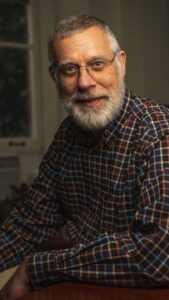 Rob Root, professor of mathematics
Rob Root, professor of mathematics
First-Year Seminar: “Mathematics of Social Justice”
In middle school, students are introduced to more complex mathematical concepts than those taught in elementary school. It’s during middle school that children are introduced to negative numbers, fractions, decimals, percentages, ratios, and other concepts that are pervasive in the real world and critical to many aspects of our everyday lives, including finances, health, decision-making, and more. It’s also during those years that, without positive role models to encourage them as they are learning these increasingly abstract skills, children are more prone to mentally checking out of their math classes—and potentially closing doors to future educational and professional opportunities. That’s where the students of “Mathematics of Social Justice”—a First-Year Seminar course taught by Rob Root, professor of mathematics at Lafayette—come in.
As part of Root’s course, Lafayette students visit middle-school math classrooms in Easton to help mentor children, develop bonds with them, and cheer them on as they tackle more challenging math lessons. These friendships with Lafayette students help change the trajectory of many Easton middle schoolers who are on the brink of disengaging from their math classes. In addition to engaging his First-Year Seminar students in community outreach, Root also uses classroom instruction to support and inform their service. The course focuses on teaching students about quantitative literacy—which Root describes as “the ability and habitual inclination to use quantitative information to understand the world, make decisions, and communicate with others”—and fairness. The school visits help the Lafayette students see the connections between math education and the acquisition of quantitative literacy, as the visits provide an opportunity to witness firsthand how helping middle schoolers make a connection between their math lessons and their lives outside the classroom can help them persist and thus develop the mathematical infrastructure that supports quantitative literacy.
Why Heart Landis
“The folks at the Landis Center are so dedicated and do so much to enable my course,” Root says. “For example, the clearance requirements for getting our students into Easton schools are amazingly stringent. I simply couldn’t manage to get all my students through the clearance process without the help of the Landis Center. My students get certified to drive Landis vans through the patient work of Landis folks. The vans are how they get to the middle school and back again. In other words, it would simply be impossible to offer this course without the resources, energy, dedication, and patience of the folks at Landis.
“I try to stop by the Landis Center a few times every semester just because of their dedication and energy. They care about the stuff that they do, and that helps me get the energy to put a little extra into my courses to get students out into the larger community. They are making so much community outreach happen, it inspires me to do my part.”
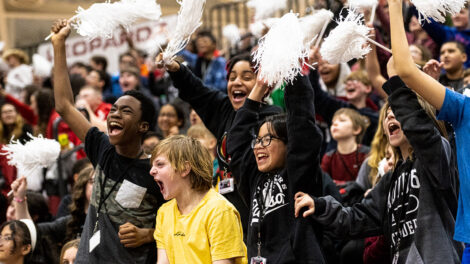
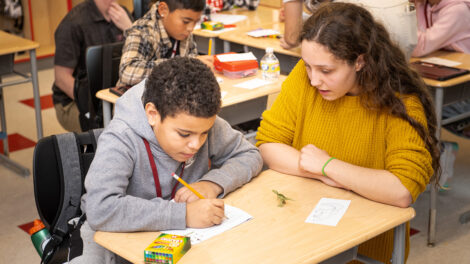
1 Comment
As a close friend and profeessional peer of John Landis, I am proud to know how much good work has come out of his thoughtfulness and benevolence in establishing this activity. It is wonderful how useful the Landis Center has become to the Easton community.A perfect example of how a college-community relationship should work.
Comments are closed.